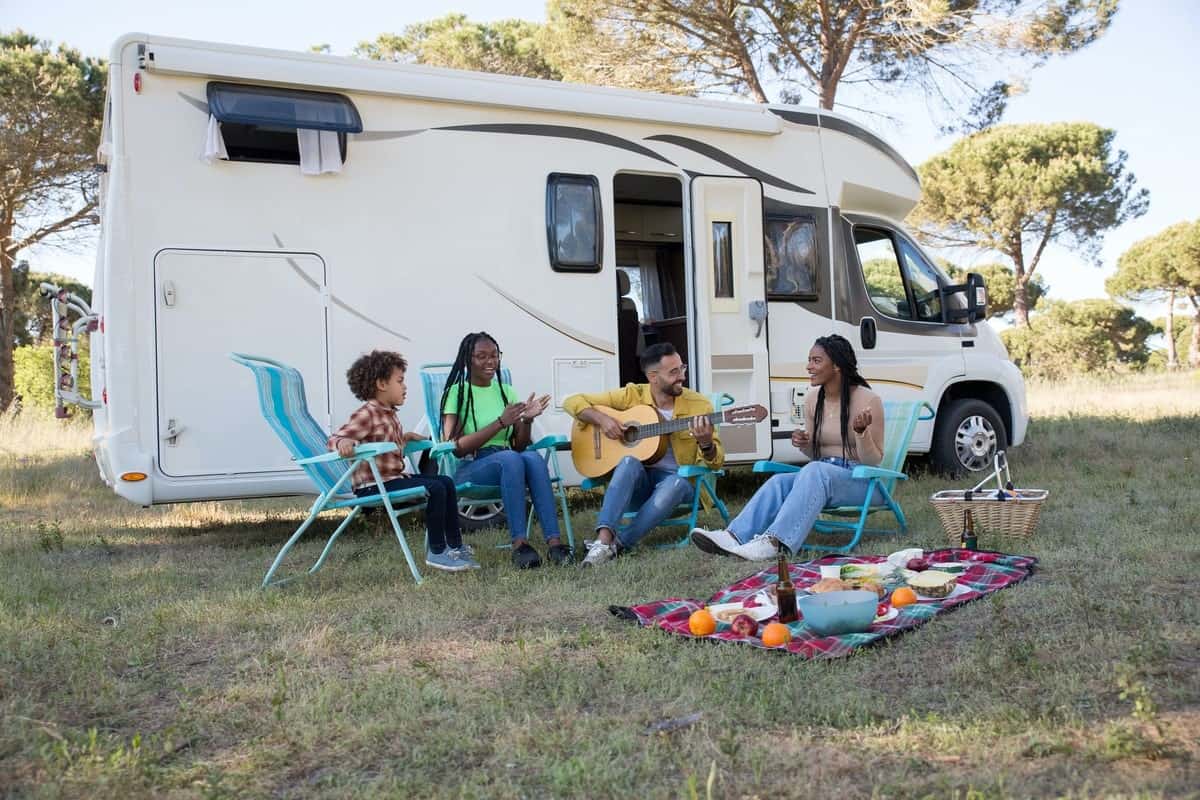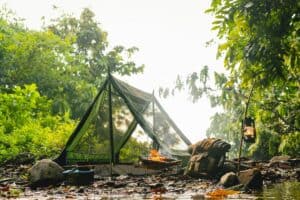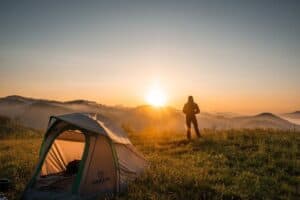Are you tired of the hustle and bustle of city life? Do you crave the freedom and adventure of the open road? If so, boondocking may be just what you’re looking for. Boondocking, also known as dry camping or off-grid camping, involves parking your RV in a remote location and living off your own resources, such as solar power and freshwater tanks. It’s a chance to disconnect from the stresses of modern life and reconnect with nature in a way that’s simply not possible in a crowded RV park or campground.
In this blog post, we’ll explore why boondocking is the ultimate RV experience, from the unparalleled freedom it offers to the stunning natural beauty you’ll encounter along the way. We’ll also provide some tips and tricks for getting started with boondocking, so you can hit the road with confidence and make the most of your off-grid adventure. So buckle up, grab your favorite travel mug, and let’s dive into the world of boondocking!
Tip #1: Plan ahead:
When it comes to boondocking, preparation is key. Taking the time to plan ahead can make all the difference in ensuring a successful and enjoyable off-grid camping trip. Here are some tips to help you plan for your boondocking adventure:
A. Research boondocking locations
Before hitting the road, it’s important to research and identify potential boondocking locations. This can involve looking at online resources like BLM and national forest maps, campground directories, and RV forums. Once you’ve identified potential locations, make sure to research the regulations and rules for camping in those areas, as well as any permit or fee requirements. Some areas may have restrictions on camping or certain activities, so it’s important to know what you’re getting into before you arrive.
B. Prepare for self-sufficiency.
One of the biggest differences between boondocking and traditional RV camping is the need for self-sufficiency. When camping off-grid, you’ll need to rely on your own resources for things like power, water, and waste management. This means bringing along solar panels or generators, freshwater tanks, and portable waste tanks. It’s also important to pack enough food and supplies to last your entire trip, since you won’t have access to nearby stores or restaurants.
C. Consider weather and road conditions.
Boondocking locations can be remote and may require driving on unpaved roads or through rough terrain. Before setting out on your trip, make sure to check the weather forecast and road conditions to ensure you’re prepared for any potential challenges. This may involve bringing along extra gear like tire chains or snow shovels or adjusting your route to avoid difficult roads or weather conditions. By planning ahead and considering these factors, you’ll be well-equipped to handle whatever nature throws your way during your boondocking adventure.
Tip #2: Bring the right equipment:
When it comes to boondocking, having the right equipment is crucial to a successful and comfortable trip. Since you’ll be camping off-grid, you’ll need to bring along all the resources you’ll need to live comfortably without the amenities of traditional RV parks. Here are some tips for bringing the right equipment on your boondocking trip:
A. Solar panels and generators
One of the most important pieces of equipment you’ll need for boondocking is a power source. Solar panels are a popular choice for off-grid camping, since they can provide reliable power without the need for fuel. Alternatively, portable generators can also be a great option for powering your RV’s electrical systems. When choosing solar panels or generators, make sure to consider your power needs, the size of your RV, and any noise restrictions in your camping area.
B. Fresh water and wastewater management
Since you won’t have access to traditional RV park hookups, you’ll need to bring along fresh water and wastewater management systems. This may involve packing portable freshwater tanks and waste water holding tanks, as well as a water pump and hoses for filling and emptying your tanks. It’s also important to have a plan for disposing of grey water and black water, since many boondocking locations have restrictions on dumping waste.
C. Campfire and cooking gear
One of the joys of boondocking is the ability to cook and enjoy meals over an open fire. Make sure to pack a portable campfire pit or grill, as well as cookware, utensils, and dishware. You’ll also want to bring along plenty of firewood, charcoal, or other fuel sources, as well as a fire starter and fire extinguisher for safety. With the right cooking gear, you can enjoy delicious meals under the stars during your boondocking adventure.
By bringing along the right equipment for your boondocking trip, you’ll be well-prepared to live comfortably and self-sufficiently during your off-grid camping experience.
Tip #3: Practice responsible camping:
When camping off-grid, it’s important to practice responsible camping to ensure that you’re protecting the environment and preserving the natural beauty of your surroundings. Here are some tips for practicing responsible camping during your boondocking adventure:
A. Leave no trace principles.
One of the most important aspects of responsible camping is following Leave No Trace principles. This means packing out all trash and waste, minimizing campfire impacts, respecting wildlife and natural resources, and staying on designated trails and campsites. By leaving no trace of your presence, you’ll help protect the environment and maintain the beauty of the area for future generations to enjoy.
B. Respect wildlife and natural resources
When camping off-grid, it’s important to respect the wildlife and natural resources in the area. This may involve following designated hiking and biking trails, avoiding disturbing wildlife, and packing out all trash and waste. It’s also important to avoid damaging natural resources like trees, plants, and water sources, and to take steps to minimize your impact on the environment.
C. Follow local regulations.
Finally, it’s important to follow local regulations and rules when camping off-grid. This may involve obtaining necessary permits or fees, respecting designated camping areas and trails, and avoiding activities that are prohibited in the area. By following local regulations, you’ll help protect the environment and ensure that you’re able to enjoy your boondocking adventure without any legal issues.
By practicing responsible camping during your boondocking trip, you’ll not only help protect the environment and natural resources, but you’ll also ensure that the area remains a beautiful and enjoyable place for future campers to visit.
Tip #4: Stay safe and comfortable:
When boondocking off-grid, it’s important to prioritize your safety and comfort. Here are some tips for staying safe and comfortable during your boondocking adventure:
A. Navigation and communication tools
When camping off-grid, it’s important to have reliable navigation and communication tools. This may involve bringing a GPS device or map and compass to navigate unfamiliar terrain, as well as a cell phone or radio for communication in case of emergencies. It’s also important to make sure that your vehicle is in good condition and has enough fuel to reach your destination and return.
B. First aid and emergency preparedness
Another key aspect of staying safe during boondocking is being prepared for emergencies. This may involve bringing a first aid kit with essential supplies like bandages, pain relievers, and antiseptics, as well as emergency items like a fire starter, extra food and water, and a whistle to signal for help. It’s also important to let someone know your itinerary and expected return time, so that they can alert authorities if you don’t return as planned.
C. Comfortable sleeping arrangements
Finally, it’s important to make sure that you have comfortable sleeping arrangements during your boondocking adventure. This may involve bringing a high-quality sleeping bag and pad, as well as a tent or other shelter to protect you from the elements. If you plan to sleep in your vehicle, make sure to bring appropriate bedding and pillows for a comfortable night’s sleep.
By prioritizing your safety and comfort during your boondocking adventure, you’ll be able to fully enjoy the beauty of the great outdoors without any unnecessary risks or discomfort.
Tip #5: Enjoy the adventure:
Boondocking off-grid can be a truly unique and rewarding experience. Here are some tips for fully enjoying the adventure during your boondocking trip:
A. Embrace the freedom of off-grid camping.
One of the best aspects of boondocking off-grid is the sense of freedom and independence it provides. Without the constraints of traditional campgrounds, you’re free to explore and camp in areas that may be off the beaten path. Embrace this freedom by going on hikes or exploring nearby areas, and enjoying the sense of adventure that comes with camping in the great outdoors.
B. Appreciate the natural beauty of the surroundings.
Another key aspect of boondocking off-grid is the opportunity to appreciate the natural beauty of your surroundings. Whether you’re camping in the mountains, by a lake, or in the desert, take some time to appreciate the beauty of the scenery around you. Take a hike, go for a swim, or simply sit and take in the beauty of the landscape.
C. Make memories with loved ones.
Finally, don’t forget to make memories with loved ones during your boondocking adventure. Whether you’re camping with friends, family, or a significant other, take the time to enjoy each other’s company and make memories that will last a lifetime. Play games, tell stories around the campfire, and enjoy the simple pleasures of camping in the great outdoors.
By fully embracing the adventure of boondocking off-grid, you’ll be able to make the most of your experience and create memories that will last a lifetime. Enjoy the freedom, appreciate the beauty, and make memories with loved ones during your next boondocking trip.
Boondocking Experience (Conclusion):
A. Recap of tips
Boondocking off-grid can be a thrilling and rewarding experience, but it also requires preparation and responsibility. Here’s a quick recap of our tips for making the most of your boondocking adventure:
- Plan ahead: Research locations, prepare for self-sufficiency, and consider weather and road conditions.
- Bring the right equipment: Solar panels, generators, fresh water and wastewater management, and campfire and cooking gear.
- Practice responsible camping: Follow leave no trace principles, respect wildlife and natural resources, and follow local regulations.
- Stay safe and comfortable: Bring navigation and communication tools, first aid and emergency preparedness equipment, and comfortable sleeping arrangements.
- Enjoy the adventure: Embrace the freedom of off-grid camping, appreciate the natural beauty of your surroundings, and make memories with loved ones.
B. Encouragement to try boondocking.
We hope these tips have inspired you to try boondocking off-grid for yourself. It’s a unique and rewarding experience that can provide a sense of freedom and independence that traditional camping can’t. By following these tips, you can ensure that you have a safe and enjoyable experience while connecting with nature in a meaningful way.
C. Call to action for sharing experiences and tips.
If you’ve already tried boondocking, we’d love to hear about your experiences and any additional tips you have for others. Share your stories and tips in the comments below and help inspire others to try this unique and exciting form of camping. Together, we can create a community of responsible and enthusiastic boondockers who love the great outdoors.




Outstanding feature
Outstanding feature